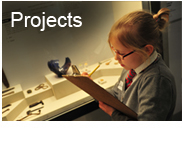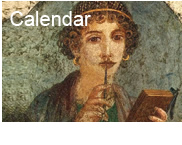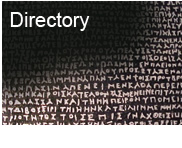Projects
In 2011, the Grants Advisory Committee of Classics for All awarded grants totalling £92,628 to eight projects, enabling hundreds more state school pupils to benefit from studying Classics in one form or another. Several schemes supported the training and development of Classics teachers.
These projects were the first to receive grants from Classics for All and qualified under our guidelines by raising awareness of the benefits of studying Classics and widening access to classical subjects.
2011
Burntwood School, Tooting
Granted £5,954 over three years.
We gave a three-year grant to this large Inner-London Girls’ school which has already introduced Latin to A’ level with great success. Teachers at Burntwood School in Tooting are now building on this remarkable achievement with the addition of lunch-time and after school classes in Ancient Greek. Twenty enthusiastic Year 9 pupils have begun working towards GCSE and a further ten pupils are hoping to join them. This scheme will embed Greek as a permanent part of the school’s curriculum. This achievement is all the more impressive as this is a school where 60 languages are spoken and 20% of pupils are eligible for free school meals.
Eight Schools in Rural Norfolk
Granted £20,500 over two years.
Seven primary schools and a secondary school in North Walsham, Norfolk have been given a two-year grant which has enabled approximately 100 state school pupils to begin learning Latin. The project is administered by the Primary Latin Project which began introducing the Minimus Latin Course, using our grant, last September. These pupils will eventually progress to North Walsham High School, where the PLP has also introduced the Cambridge Latin Course, with the option of continuing to GCSE.
Norwich Castle Museum – Latin Project
Granted £1,000 over one year.
The opportunity to meet a Latin-speaking Roman soldier or a retired General may just be the fun introduction to Classics that inspires a life-long passion. This is why we funded two special days at Norwich Castle museum this year (for 80 primary school children each day) from rural schools across Norfolk. Children will be able to handle Roman artefacts and take part in a Roman play and poetry session. The project is co-ordinated with the plan to introduce the Minimus Course in North Walsham, so that pupils have a clear route for taking their interest further.
Successful proposals from Bristol and Liverpool Universities tackle a fundamental issue we face in the Classics world: we need to train and inspire the next generation of specialist teachers, and we need them now!
Bristol University – Outreach Project
Granted £6,224 over two years.
Bristol University’s Institute of Greece, Rome and Classical Tradition has received a two-year grant to provide teaching bursaries for four post-graduate and advanced undergraduates to teach 60 Year 7–9 pupils in local state senior schools. The students will offer ‘taster’ sessions to younger pupils, moving on to preparation for GCSE study for the year 9′s. The students will teach four courses each year for ten weeks, one hour per week. Bristol has established a good reputation for its work in the community and with local schools.
Liverpool University – Outreach Project
Granted £16,450 over one year.
At Liverpool University’s School of Archaeology, Classics and Egyptology, two Graduate Teaching Fellows have been able to begin teaching six hours per week in ‘partner schools’, where provision in Latin and Greek was either limited or non-existent. The project aims to embed Classics fully in the schools’ curriculum and encourage a new generation of Classicists to look at teaching in the state sector as a career. The department already runs several projects in Merseyside schools, including language taster days and a summer school, working closely with Liverpool’s Educational Opportunities department.
Cambridge School Classics Project
Granted £25,000 over two years.
Our grant to the Cambridge School Classics Project will create a course aimed at introducing pupils to Homer, Ovid and the classical epic as part of the Key Stage 3 English curriculum. Designed to improve pupils’ speaking and listening skills, each module will include an audio re-telling of the story, a scheme of work and some visual resources. Although it will first be tested with over a thousand pupils at four state schools, within two years a further fifty secondary schools will be involved, reaching nearly fourteen thousand pupils in Cambridge Schools.
Cambridge University Faculty of Education
Granted £12,500 over one year.
Non-specialist Classics teachers often work without any practical support, so this is why we chose to fund a project presented by the Cambridge University Faculty of Education. This project will develop and publish digital Continuous Professional Development materials which champion best practice. Examples of exemplary teaching by state school Classics teachers will be captured via video and podcasts. Topics will include teaching comprehension and vocabulary.






